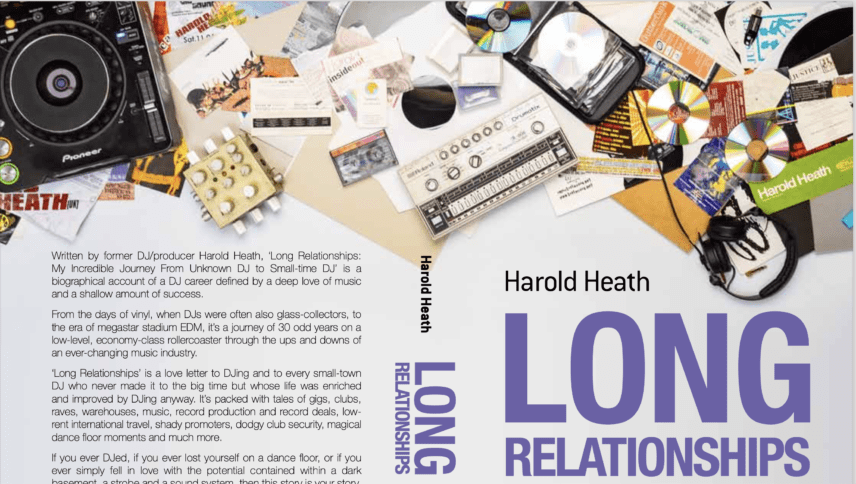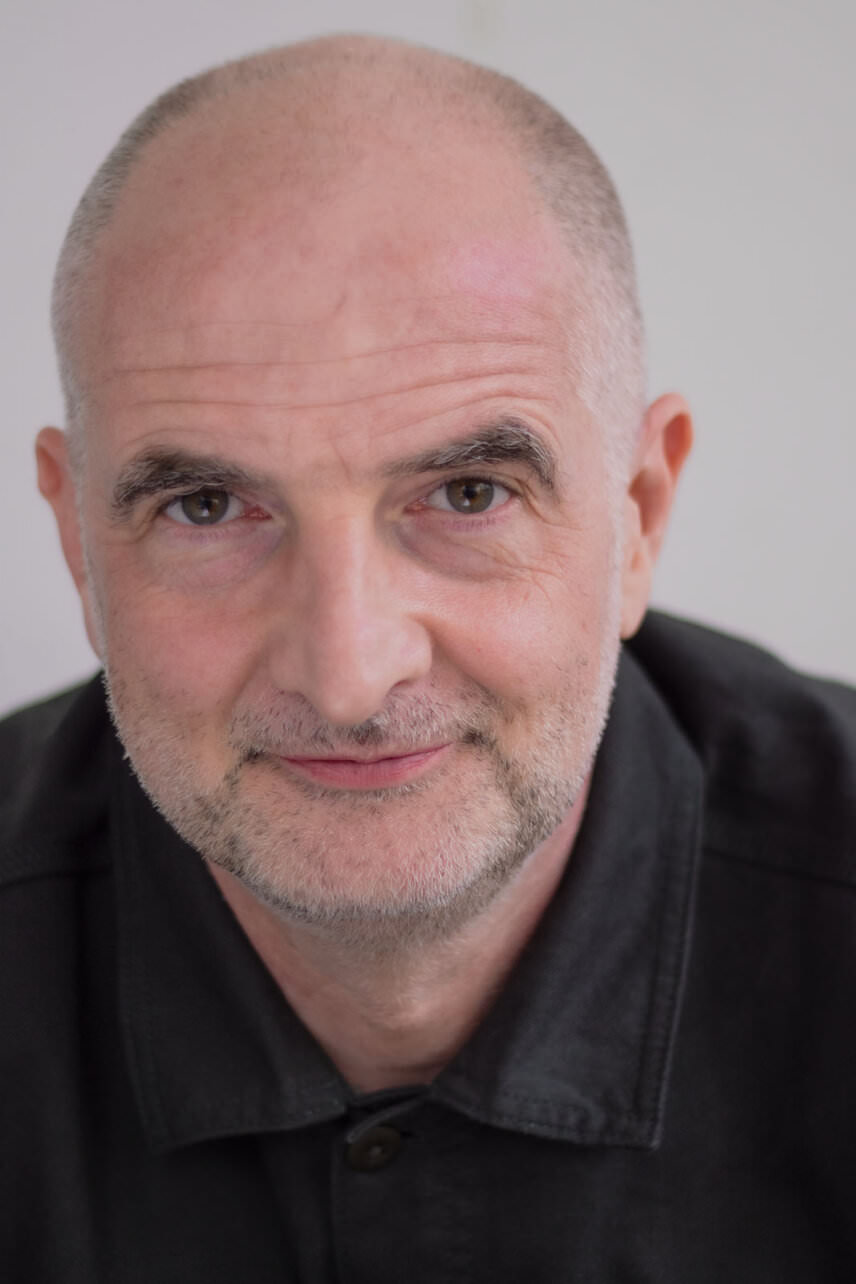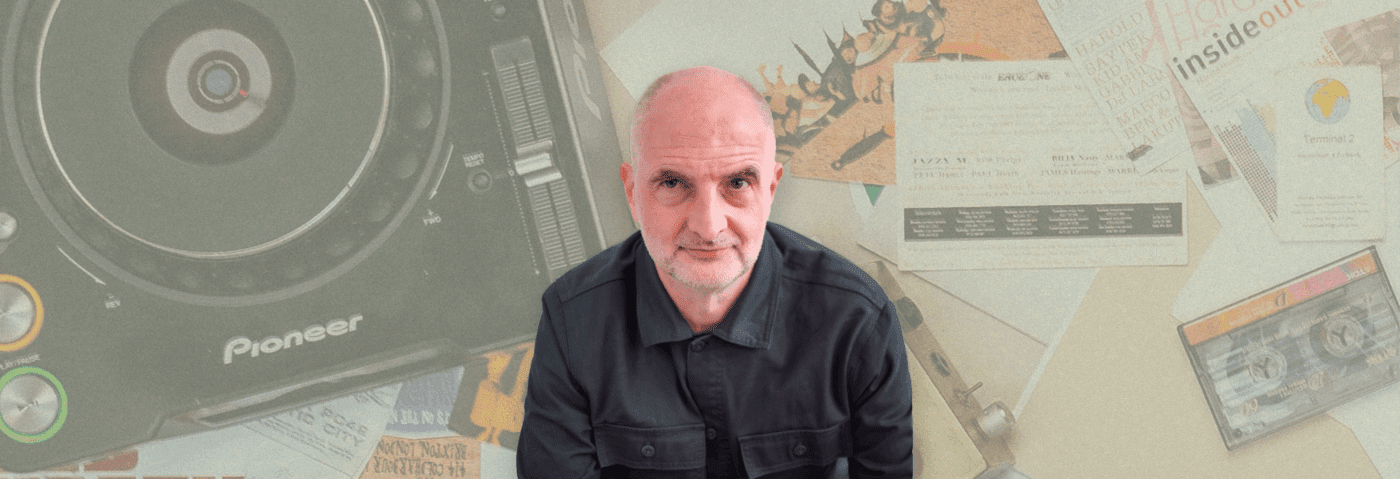‘Long Relationships: My Incredible Journey From Unknown DJ to Small-time DJ’ is a new book written by former DJ/producer Harold Heath and Attack features editor.
It’s not every day you’ll interview one of your own but this is different. Harold Heath first told me about his book at ADE some years ago and by the Tuesday after the event, I’d read it cover to cover. It’s a fascinating tale for the reason that it’s not particularly remarkable in any particular way. That’s what makes it so wonderful.
Any producer / DJ or even in the creative sectors as a whole will tell you that ‘making it’ (a subjective term at best) is not always the case. For a large part, Harold’s story is the most familiar.
But it’s not told in a remorseful, resentful manner but narrated as the career that never was. Overall, it’s the commitment to dance music that should resonate with anyone looking to make their passion their career.
It’s a great read, a particularly easy interview to arrange (!) and a book Attack readers should enjoy. We asked Harold to elaborate.
Attack: Do you think it’s important people read about ‘the career that never was’? What do you think you’d most like for someone to take away from your book?
Harold: It’s interesting, I never really considered that people would take different things away from it at all. For some it’s pure nostalgia, others were most interested in the parts about DJing, or about the changes in the industry. Lots of people have got in contact to say it resonated with their stories, others have said they thought it was funny, or bittersweet, etc and I guess this has made me realise that people bring their own experiences and ideas to a book, and take away their own version of what you produced.
DJ and author Bill Brewster read it and said that among the jokes he thought there was a lot of “sage advice about the pitfalls of the industry” and I can see now that it’s published, and I’ve got a little distance from it that that’s true.
But I didn’t particularly set out to write a cautionary tale, I just wanted to tell my story. I guess I’d like people to take away the idea that a life devoted to doing something you love is a life well spent.
So do you think that this book can potentially help guide someone’s career?
I guess now yes, looking at it as a whole, the story does contain a few decent pointers, some aspects of it that could be helpful to someone starting out in the music industry.
Again, it’s not at all what I was thinking when I wrote it, but once your book is out in public then it’s no longer yours, and you can’t control what people are going to think about it or bring to it. Which is a bit magical and also a little scary.
Over the course of the timeline in your book, things have changed significantly both in production but also in nightlife culture. What do you think are some of the most obvious?
DJs used to DJ alone, but now they’re always teaming up with a buddy or even into a DJ threesome, which is ironic because the improvements in DJ technology over the last few years mean that you barely need one DJ to play a set, let alone two or three.
I think that as DJs we probably feel that the change in formats from vinyl to CD, to laptop and USB DJing is the most significant. It seemed important at the time when I was a part-time DJ, but now I think that perhaps the changes in format – and the associated negative impact it had on music makers and artists were part of a bigger trend, which we could call it digitisation, or internetism – the process of making things available digitally, be it music, books, films, whatever. This process has had profound effects on each of those industries and the music industry is still living through the impact of that change. So maybe that’s the single most obvious thing.
Personality and celebrity have become more important in some areas of the industry and we like to have a moan about Instagram DJs, crowds that don’t dance and so on – but of course, the reality is that there are plenty of great parties that book proper DJs and where people go dancing to underground music with their friends. So although it would be untrue to say the cult of celebrity hasn’t adversely affected nightlife culture, you could also argue that the commercial end of the scene just gives the underground something to define itself against.

The book never sounds regretful but more reflective. If you could go back to the beginning, what would you have done differently to ‘make it’?
I’d have bought loads of 303s and 909s for pennies in the late 80s, copyrighted the ‘smiley’ symbol and invested heavily in bitcoin and surface-to-air missiles.
In the book, I wonder if at least part of my failure to scrabble any further up the DJ ladder was that I wasn’t an international hard-drinking off-the-wall party animal. People seemed to expect more and more excess from their DJs, both during the gig and after it too whereas off the decks I’m a pretty low key dude. So I’m not sure I could really change my personality, but I guess I could have played the game a bit more, tried to fit in a bit more. Also, I could have done more self-promotion – I was always one of those curtains-drawn studio-gibbons who wanted the music to do the talking rather than actually have to promote it.
Perhaps if I’d been a bit more of a ‘character’ and was a bit more pushy or ruthless then I might have had a different career path. But to be honest, a more pushy, ruthless ‘character’ version of me sounds pretty awful.
Music journalism is incredibly important but is in a tough place as a career/business. What would you say to someone looking for a career as a music journalist or a music writer?
It is a tough career and you’re probably going to need some other job role – preferably part-time, from home and flexible – that you can also earn from at least at the beginning. Don’t write for free, unless it’s for your own blog; if they can’t pay you then they don’t have a workable business model.
In terms of writing itself, the two things that have helped me the most is reading books and writing every day. While there’s obviously nothing wrong with reading articles or features in magazine or online, I feel like there’s a particular cognitive process that is involved in reading a book – whenever you return to it you have to recall or at least be aware of substantial chunks of what you’ve already read and then somehow link this up to the new material and I feel that this particular process is also somehow beneficial when it comes to writing.

Books also obviously can give you ideas about how to use language, how to write in a different style and so on. For example, while I don’t think my writing compares to David Simon’s (co-writer of ‘The Wire’) his ‘Homicide: A Year On The Killing Streets’ book really influenced how I wrote a particular section of my book.
Writing’s like anything, if you do it a lot, you’ll get good at it, so you’ll need to do it a lot. Writers, I think, need to recognise that when we think ‘I don’t have enough time today/I need a longer writing session to really bash this out/I’ve not researched enough/I need a dedicated writing spot in my flat first/ I’m not sure I know enough about this’, whatever the reason we come up with for not writing, it’s just procrastination, it’s just the brain attempting to avoid hard work.
The single most important and liberating thing I learnt writing my book was that most of the best ideas don’t appear before you write, they come as you write.
You talk a lot about playing music you don’t enjoy for example playing Toxic by Britney Spears. What would you say to someone who is going through that where they are playing to get paid but not enjoying it?
Well, it’s true that I do moan about it a bit in the book, but it was still preferable to other jobs that I could have done. I’m just quite the misanthrope really, there’s a part of me that , perversely, quite enjoys moaning. I guess DJing at Los Locos was such a contrast to the DJing that I wanted to do that it seemed all the more intense at the time, but ultimately it was useful as the pay was OK and although mostly a little annoying it was very occasionally fun – and that’s just like countless other jobs right? It was definitely preferable to the various other part-time Mc-jobs that I took to support my DJ and production career over the years. So I guess I would say to someone going through a similar situation something like why don’t you go and redeem one of your drinks tickets, play Beyonce and stop moaning, things could be way worse :o)
Boxia’s tweet started a huge conversation. So let’s hear it then… what’s the most embarrassing thing you’ve done to a dance floor?
Dance on it.
If the book now ironically made you a ‘successful DJ’ would you be forced to pull it from the shelves or revise this one so that it ends as a successful career?!
I guess I could write a volume 2 – ‘Long Relationships: The Success Years’. No doubt I’d find something to moan about the superstar DJ lifestyle though, these first-class seats are the wrong colour, this artisan-distressed MDMA isn’t free-range, that kind of thing.
Last question, which Harold Heath track neatly sums you and your book up?
None of them really. I was never much of a fan of my music when DJing and certainly didn’t listen to it at home other than when I was making it. I might nominate my pair of Spin Science remixes that I did around 2009, as I really liked them, thought they were cool but they sold next to nothing, there’s some symbolism in there I’m sure. Or maybe I could choose ‘Get Closer (Boys Mix)’ on Lost My Dog as it has lots of early potential but then makes a couple of unfortunate musical turns and ultimately could be said to not fulfil its early promise…!
‘Long Relationships: My Incredible Journey From Unknown DJ to Small-time DJ is out now on Velocity Press.
Follow Harold Heath on Twitter.
While you’re here…
